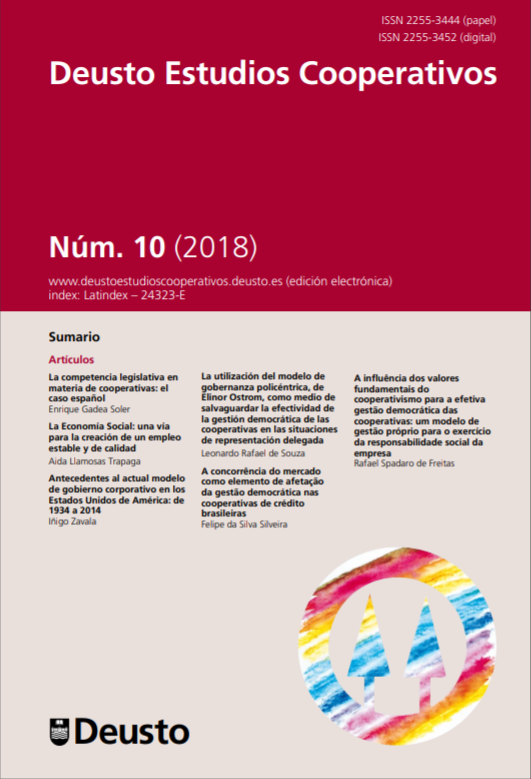La utilización del modelo de gobernanza policéntrica, de Elinor Ostrom, como medio de salvaguardar la efectividad de la gestión democrática de las cooperativas en las situaciones de representación delegada
Abstract
In accordance with the principle of democratic management, cooperatives are organizations controlled by their members, who participate actively and directly in determining their policies and in making decisions. However, when the cooperative society increases considerably in terms of territorial coverage or number of members, the law of Brazilian cooperatives establishes the possibility of delegated representation for the holding of general assemblies. In this sense, this article aims to analyze the model of polycentric governance developed by Elinor Ostrom, using it as a theoretical alternative to explain the democratic management of large cooperative societies that have the opportunity to delegate representation. The aim is to confirm that the adoption of delegated representation forms a multidemocratic governance system that not only does not affect the participatory essence of all members but also protects democracy in cooperative management advocated by the maxim of one man one vote. To materialize the research, we will use the inductive approach method with indirect research use.
Received: 04 September 2017
Accepted: 20 November 2017
Downloads
The authors, by submitting their manuscripts to the Deusto Estudios Cooperativos (DEC), accept the conditions listed below on copyright and undertake to comply with them. They do not sign any document of assignment of rights to the Publisher.
1. Authorship: The author must be the sole creator of the work or legally acting on behalf of and with the full agreement of all the authors.
2. Copyright and Code of conduct:
a) Authors warrant that their work is original; has not been previously copyrighted or published in any form; is not under consideration for publication elsewhere; its submission and publication do not violate the Ethical Guidelines of DEC and any codes (of conduct), laws or any rights of any third party; and no publication payment by the Publisher (University of Deusto) is required.
b) Authors grant to the Publisher the worldwide, sub-licensable, and royalty-free right to exploit the work in all forms and media of expression, now known or developed in the future, for educational and scholarly purposes.
c) Authors retain the right to present, display, distribute, develop, and republish their work to progress their scientific career provided the original publication source (DEC) is properly acknowledged.
d) Authors warrant that no permissions or licences of any kind have been granted or will be granted that might infringe the rights granted to the Publisher.


3.jpg)
3.jpg)







